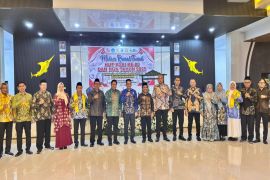Jakarta (ANTARA) - The Indonesian government will intensify manpower-intensive infrastructure projects in different parts of Indonesia to offer employment to members of the low-income community to maintain their purchasing power amid the ongoing COVID-19 pandemic.
"Manpower-intensive infrastructure projects are also aimed at boosting economic growth and distributing funds to villages and rural areas," Public Works and Housing Minister Basuki Hadimoeljono noted in a statement that ANTARA received here on Wednesday.
In implementing these labor-intensive infrastructure projects to maintain the purchasing power of people from the low-income group and to reduce unemployment, the social distancing measures will consistently be imposed to contain the COVID-19 outbreak, he explained.
To this end, the Public Works and Housing Ministry will expedite the realization of this year's labor-intensive projects, financed in cash, in 34 provinces across Indonesia.
With a total budget of Rp10 trillion, the projects cover seven programs, including the Irrigation System Accelerated Program (P3-TGAI), Socio-Economic Regional Infrastructure Development Program (PISEW), and Reduced, Reused, and Recycled Waste Management Sites (TPS3R), he revealed.
The Social Affairs Ministry has also readied special social assistance for economically vulnerable groups impacted by the COVID-19 pandemic.
Social Affairs Minister Juliari P. Batubara noted that the first aid package was prepared for vulnerable groups residing in Jakarta, which has imposed large-scale social distancing to contain the pandemic.
The coronavirus disease initially struck the Chinese city of Wuhan at the end of 2019. Since then, it has spread to at least 202 countries and territories, including Indonesia, with a massive hike in the death toll.
This condition prompted the World Health Organization to declare it a global pandemic. Public health and economy in so many countries are bearing a major brunt of the COVID-19 pandemic.
As a result of a huge decline in the occupancy rates, several hoteliers in Indonesia, for instance, had forcibly laid off or sent their workers home. Scores of Indonesian migrant workers have also begun returning to Indonesia.
According to the Indonesian Foreign Ministry, as of April 6, some 44,650 Indonesians in Malaysia had returned to the homeland, while several others of the 1.2 million Indonesians are still residing in the neighboring country.
Related news: Some 5,047 West Java workers laid off as COVID-19 impact
Related news: Indonesia tests 14,354 samples for COVID-19 infection
EDITED BY INE










